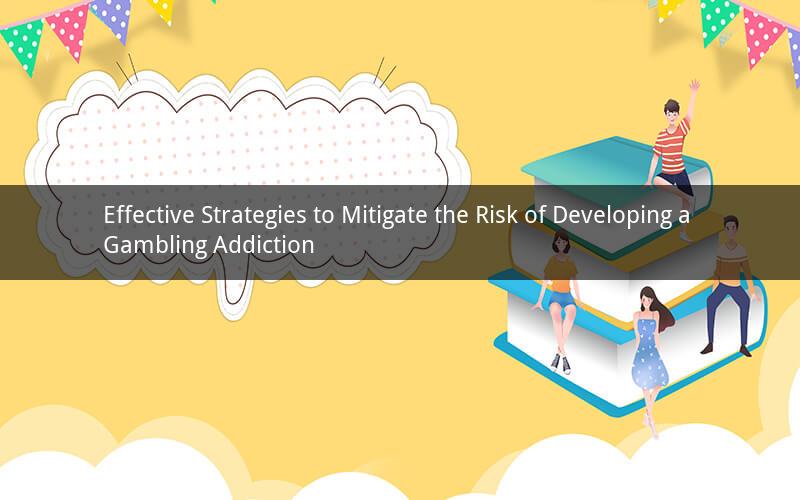
Gambling addiction is a serious issue that can lead to significant negative consequences for individuals and their families. To mitigate the risk of developing a gambling addiction, it is essential to understand the factors that contribute to this problem and implement effective strategies to promote responsible gambling. This article will explore various approaches to limit the risk of developing a gambling addiction and provide valuable insights into maintaining a healthy relationship with gambling.
1. Educate Yourself about Gambling
The first step in mitigating the risk of developing a gambling addiction is to educate yourself about the risks and consequences associated with gambling. Understanding the odds of winning, the psychological effects of gambling, and the potential for financial and personal problems can help you make informed decisions.
a. Learn about the odds of winning: Many gambling games have a low probability of winning, making it essential to recognize that gambling is a form of entertainment, not a way to make money.
b. Understand the psychological effects of gambling: The thrill of winning and the potential for big payouts can lead to an increase in dopamine levels, making gambling addictive. Familiarize yourself with the psychological aspects of gambling to recognize the signs of addiction.
c. Be aware of the potential consequences: Financial, emotional, and personal problems can arise from gambling addiction, so it's crucial to be aware of the risks and seek help if needed.
2. Set Clear Limits
Establishing clear limits is crucial in preventing gambling addiction. Set both financial and time limits to ensure you don't overindulge in gambling activities.
a. Financial limits: Decide on a budget for gambling activities and stick to it. Avoid chasing losses by increasing your bets, as this can lead to significant financial problems.
b. Time limits: Allocate specific time periods for gambling and stick to them. Avoid spending excessive amounts of time gambling, as this can lead to addiction.
3. Practice Self-Exclusion
Self-exclusion is a strategy that involves banning yourself from gambling venues or online platforms. This can help prevent relapse and provide a strong deterrent against gambling addiction.
a. Self-exclusion programs: Many countries offer self-exclusion programs for individuals struggling with gambling addiction. These programs allow you to ban yourself from gambling venues for a set period.
b. Online self-exclusion tools: Use online self-exclusion tools provided by gambling platforms to prevent access to your account and limit your exposure to gambling websites.
4. Seek Support
Support from friends, family, or professionals can be invaluable in mitigating the risk of developing a gambling addiction.
a. Support groups: Joining a support group, such as Gamblers Anonymous, can provide a sense of community and offer strategies to overcome addiction.
b. Professional help: If you suspect you or someone you know is struggling with a gambling addiction, seek help from a mental health professional who specializes in gambling addiction.
5. Promote Responsible Gambling
Promoting responsible gambling involves spreading awareness about the risks of gambling addiction and encouraging individuals to practice healthy gambling habits.
a. Share information: Educate friends and family about the risks of gambling addiction and encourage them to seek help if needed.
b. Advocate for responsible gambling policies: Support policies that promote responsible gambling, such as age restrictions and responsible advertising.
Frequently Asked Questions
1. How can I recognize the signs of a gambling addiction?
Answer: Signs of a gambling addiction include secretive behavior, neglecting responsibilities, borrowing money, lying about gambling activities, and experiencing mood swings.
2. Can I overcome a gambling addiction on my own?
Answer: While some individuals may overcome a gambling addiction with self-help strategies, seeking professional help is often more effective. A therapist or counselor can provide personalized support and coping mechanisms.
3. Is it possible to prevent a gambling addiction if I enjoy gambling occasionally?
Answer: Yes, it is possible to prevent a gambling addiction if you enjoy gambling occasionally. Set clear limits, educate yourself about the risks, and be mindful of your gambling behavior.
4. What are the long-term consequences of a gambling addiction?
Answer: Long-term consequences of a gambling addiction include financial ruin, strained relationships, legal problems, and mental health issues such as depression and anxiety.
5. How can I support a friend or family member struggling with a gambling addiction?
Answer: To support someone with a gambling addiction, encourage them to seek help, offer a listening ear, and be patient. Educate yourself about gambling addiction to better understand their struggles and offer informed support.